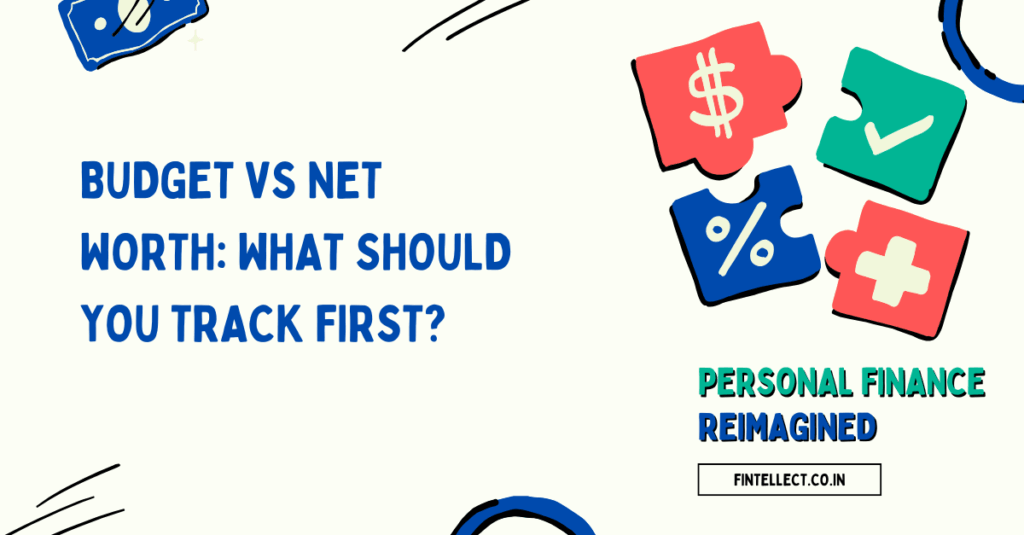The Everyday Dilemma
Picture this: Priya has been diligently tracking her monthly expenses in a notebook. She knows exactly how much she spends on rent, groceries, and even her weekend Zomato orders. Yet at the end of the year, she still feels unsure – am I actually building wealth, or just moving money around?
On the other hand, her colleague Arjun proudly talks about his net worth – how his investments in mutual funds and gold are growing. But when you ask him how much he spends every month, he shrugs. He often struggles to pay his credit card bill on time.
So who’s doing it right – Priya with her budget, or Arjun with his net worth tracking? The answer is: both are important, but where you begin matters.

Breaking It Down: Budget vs Net Worth
Let’s simplify these terms:
- Budget: A plan for your money. It tracks your income and expenses – basically, what comes in and what goes out every month. Think of it as your day to day money manager.
- Net Worth: A snapshot of your overall financial health. It’s everything you own (assets like savings, property, investments) minus everything you owe (liabilities like loans, EMIs, credit card dues).
In short:
- Budget = short-term control.
- Net Worth = long-term progress.
Real-Life Example (Indian Context)
Take Rohan, a 27-year-old marketing professional in Delhi. He earns ₹70,000 a month.
- He makes a budget and knows he spends ₹20,000 on rent, ₹15,000 on lifestyle expenses, and ₹10,000 on savings.
- But he has a personal loan of ₹3 lakh and a credit card debt of ₹50,000.
Even though Rohan’s budget looks neat, his net worth is negative (liabilities are higher than his assets). Without looking at his net worth, he may not realize how much debt is weighing him down.
Now consider Ananya, a 32-year-old schoolteacher in Chennai. She earns ₹45,000 and doesn’t keep a strict budget. But she has ₹5 lakh in fixed deposits and mutual funds, no loans, and a small flat in her name.
Her net worth is strong, even though she isn’t budget-focused.
Both stories show that tracking only one piece of the puzzle doesn’t give the full picture.
Common Mistakes People Make
- Thinking budgeting alone is enough. You might know where your money goes, but without net worth tracking, you can’t see if you’re actually growing wealth.
- Believing net worth is for the rich. Not true – even students or young professionals should know their net worth, even if it’s small or negative.
- Ignoring liabilities. People often count their assets (like property or savings) but “forget” about loans or credit card balances. That gives a misleading picture.
So, What Should You Track First?
If you’re just starting out, begin with your budget. Why? Because managing day-to-day expenses helps you avoid debt and frees up money for savings.
Once you’re comfortable with your budget, move on to tracking your net worth. That’s the bigger picture that tells you whether you’re moving towards financial freedom or staying stuck.
Think of it like health:
- Budget = your daily diet plan.
- Net worth = your overall fitness level.
You need both for long-term well-being.
Actionable Tips You Can Try Today
- Write down your income and expenses for the last month – spot areas where you overspent.
- List your assets (bank balance, FDs, gold, investments) and liabilities (loans, EMIs, dues).
- Calculate your net worth: Assets – Liabilities.
- Repeat this exercise every month.
Doing it manually can feel overwhelming. That’s where Fintellect comes in handy – you can upload your bank statements, track your spending patterns, and instantly see your net worth. It saves time, reduces errors, and gives you clarity in minutes.
Final Thoughts
Budgeting and net worth aren’t rivals – they’re partners. Start with a budget to gain control over your money, then track your net worth to measure long-term growth. Together, they give you the complete picture of your financial health.
Remember: it’s not about how much you earn, but how much you keep and grow.
Start using Fintellect today and get clarity on your finances in minutes.
Who’s actually better off?